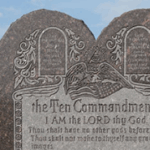What’s my “Why?” Part 2: What’s my problem with the 10 Commandments?
(In Part 1 of this series I said…
I think quite a lot about politics these days. Some of you know I even went as far as to apply to the LBJ Women’s Campaign School which I am in the middle of completing right now. During the first week of campaign school one of the main things we talked about is “What is your ‘Why?’” What has gotten you up off the couch and moving? What is going to keep you motivated when things get hard and you are tired? I heard lots of inspiring stories from other people about their various “Whys.” I thought all week about my “Why.”
One of the problems with me being a politician is that I have a hard time explaining my “why” in a way that is moving and inspiring. I tend to take too many words to explain it, it doesn’t fit very well on meme, or a sticker, or even one of those big, glossy postcards you get during campaign season, but I’ll take a swing at explaining at least part of it here…
This is me still working through my “Why.” – ABT)
By Ashley Bean Thornton
 Here’s the deal…I don’t have a problem with the 10 Commandments. I very much have a problem with a law that requires the 10 Commandments to be posted on the wall in every public school classroom in Texas.
Here’s the deal…I don’t have a problem with the 10 Commandments. I very much have a problem with a law that requires the 10 Commandments to be posted on the wall in every public school classroom in Texas.
I have a problem with this law because religious freedom is important to me, and I believe this is a step away from religious freedom and toward establishing a state religion.
I often get push back from friends who take their faith very seriously. They ask me things like, “Why do you have a problem with the 10 Commandments?” “What commandment do you have a problem with?”
I get the impression that they think I oppose this bill because I somehow oppose the 10 Commandments or faith or Christianity. Or maybe they think I oppose it because I don’t think faith is important, or because I don’t believe faith has the power to change behavior and make things better.
In fact, it’s the opposite. I oppose this bill because I profoundly believe in the importance and power of faith. My faith is the most basic thing about me. It is precious to me – sacred.
Because my faith is so important to me, it is important to me that I am free to pursue it as honestly as I possibly can: that I am free to ask every question, that I can fearlessly consider that I may have misunderstood and that I may need to learn and change, that I am free to disagree with people around me sometimes. I don’t want my faith to be “blind faith” — I want to bring my whole self to it, including my mind and life experiences.
Because my faith is so important to me, it is important to me that every person be free to pursue their faith honestly.
I believe efforts to establish a state religion interfere with the honest pursuit of faith.
Once the state puts a thumb on the scale and says, “People who follow this particular version of this particular religion will enjoy the support of the state; people who pursue other religions or other versions of this religion will not enjoy the same support” — then people have to weigh their free and honest pursuit of faith and faithful living against the benefits they would enjoy by just going along with what the state says is preferable.
In worst case scenarios, people have to weigh their honest pursuit of faith and faithful living against the dangers of disagreeing with the version of religion favored by the state.
I’d like to think that we don’t have to worry about this worst case scenario, but it has happened before, and it is happening now in some parts of the world. I don’t have any particular reason to believe that we are better people than those people. That’s why it is important to keep a steady eye on our laws and to make sure they are in line with our values. One of my core values is religious freedom.
I have friends who think I am making way too big a fuss over this 10 Commandments thing – what could it hurt to have the 10 Commandments on display? Maybe it will help? It never hurts to be reminded “thou shalt not steal,” right? Or sometimes my friends say, “It’s no big deal. This law doesn’t have anything to do with a ‘state religion.’ It’s just a way of teaching children where laws come from.”
Here’s why I think it is a big deal and why it does have to do with a state religion…
If our legislators are convinced we have a problem with school children stealing, and that a poster on the wall is a way to fix that problem, why not pass a bill that requires a poster in every public school classroom that simply says, “Don’t Steal!” Why get entangled with using a religious version of this straightforward message?
If our legislators believe this 10 Commandments requirement is about teaching children where laws come from, why require it in every classroom? Why not just mention it in the social studies curriculum. Why require that it be posted in every second grade classroom, every calculus classroom, every music classroom?
I think it is because this bill is not really about getting kids to stop stealing or about helping kids understand the history of law. I think this bill is a part of a long-standing, well-organized and maybe even well-intentioned effort to “put religion” – specifically conservative Christian religion – “back in schools.” I believe that once this step is accomplished, its proponents will move on to another step, and another with the goal of making it clear that conservative Christian religion is favored by our public schools, and by extension, our government.
However well or ill-intended that effort may be, I disagree with it. As I have already explained above, I think state-established religion is the wrong way to go for people who hold the honest pursuit of faith as a sacred right.
To be clear, I don’t have any particular problem with conservative Christian religion. It’s not my particular version of Christianity, but I believe conservative Christians have a right to their beliefs, just like I have a right to mine, and other people have a right to theirs. What none of us have the right to do is to establish our religion as the preferred religion of the government.
Some people believe that the United States should be a Christian nation. They believe that Christianity – their particular brand of Christianity – should be the state religion. I disagree. I believe the United States should be a nation where everyone has a right to pursue their own faith honestly. For some people, that means they will not profess conservative Christianity, or Christianity period, or even a faith in God. I can’t imagine life without my own faith, but I also cannot imagine telling someone they do not have a right to their own honest religious journey.
This last session the Texas Legislature passed a bill that will require the 10 Commandments to be displayed in every public school classroom in Texas. The Governor signed that bill into law. I oppose this law on the grounds that the “establishment of religion” is bad for the honest pursuit of faith and therefore bad for people. A passionate belief in the sacred right to religious freedom, the right of every person to pursue their own faith honestly without pressure or even a nudge from the government, is a big part of my “why.”

I agree with you in part. I believe the legislature should have passed a law permitting teachers to post the Ten Commandments in their classrooms. We must remember there is no such thing as freedom of religion in the Constitution. The first amendment has two religion clause: no establishment of religion, and the free exercise. Allowing teachers to post the Ten Commandments fulfills both parts of the religion portion of the first amendment.
I don’t have a problem with posting the Ten Commandments if it has something to do with a lesson. I don’t have any particular problem with teachers having a Bible verse on their desk or even on the wall depending somewhat on the verse. I can see how religious quotes – be they Christian or otherwise could be fine as long as they promote positive behavior. The golden rule is a good example of that. There are some verses that could be a problem, but probably most verses teachers would be interested in posting would be fine. I think it’s fine for people to be exposed to and learn about other people’s beliefs as long as there is no pressure to adopt the same beliefs. That’s all part of learning to live together. It’s fine as long as we approach it in a spirit plurality. I do have a big problem with a law requiring scripture from a particular religion to be posted.
There you go with common sense again. I love God and try to live my faith. Many children in my school are familiar and worship in or know about Christian traditions, but we have other faiths represented too. I’m wondering if their holy scripture about behavior or religious laws should be represented too. If so, where would one would visit with families about their preferences of displaying similar holy texts?
Nice article Ashley. I feel I know more about what your against in this than what your for. I am for the intentional training up of young children in ethical and moral teaching starting at a very young age. Having the 10 commandments required in all classes is just a starting point to encourage teachers to help children find or guide them to their “why”. I think it’s reckless to hope children find a positive why in today’s culture without a very intentional curriculum. Youth are surrounded by all types of wrong “why’s” today in music, tv, billboards, smartphones, and society in general. Teachers and schools have their minds and hopefully their hearts even more than parents to. These children are our future and it’s a wasted opportunity and huge missed opportunity not guide them to something that so much potential to help them find peace, acceptance, faith, and self love.
I agree that there should be guard rails built in but saying no for the sake of protecting a political point of view isn’t the way in my opinion. The pros far outweigh the cons on this one.